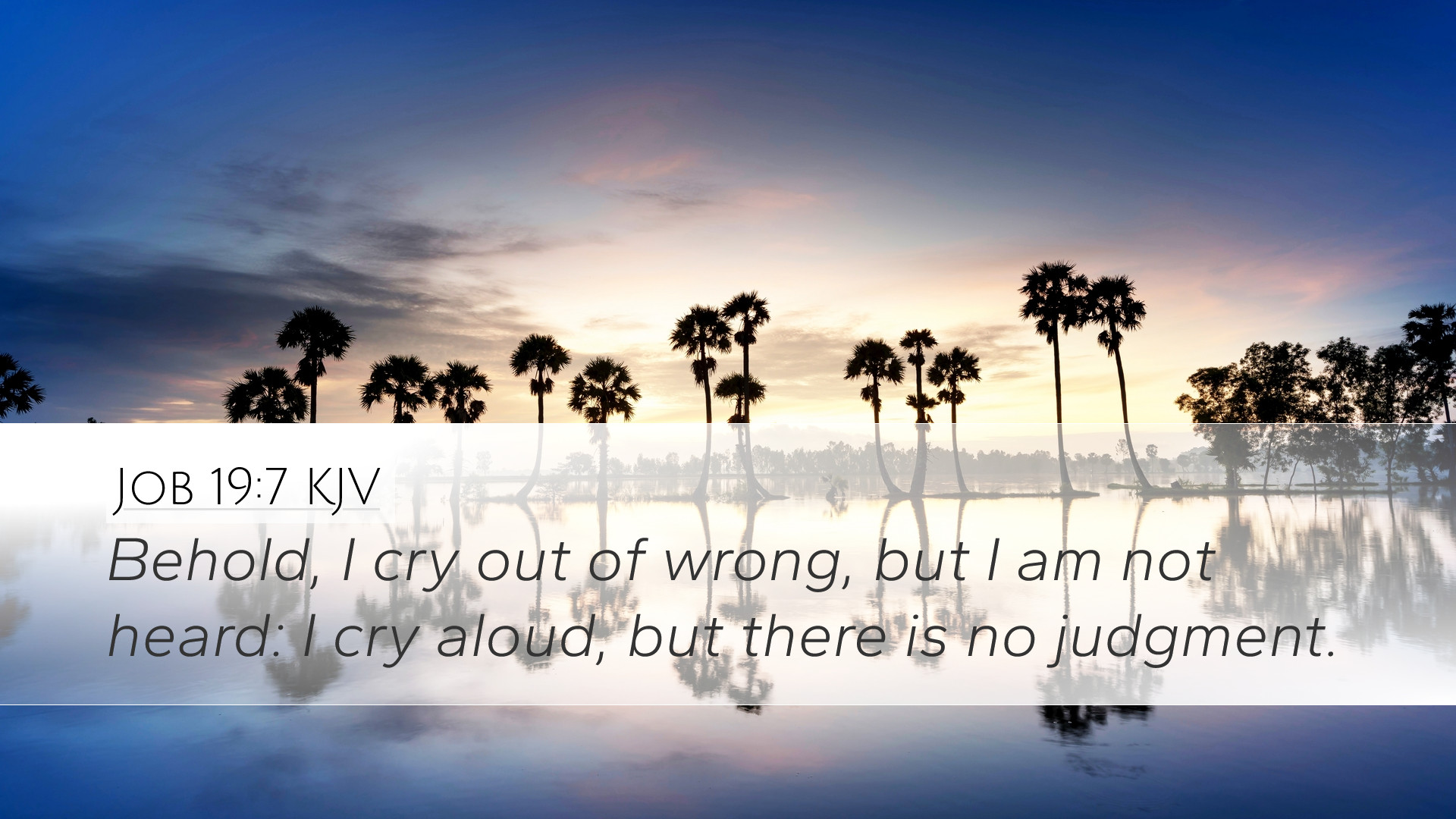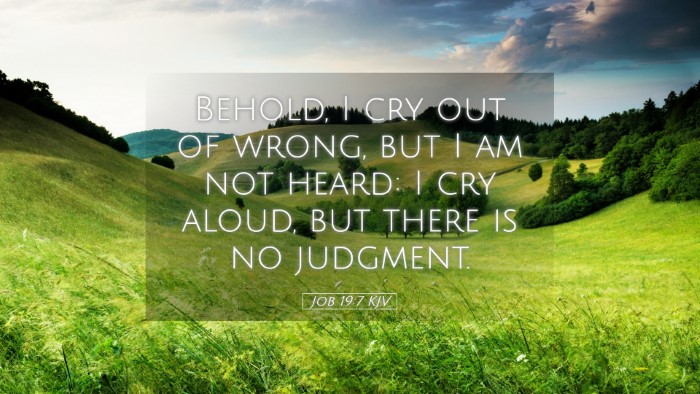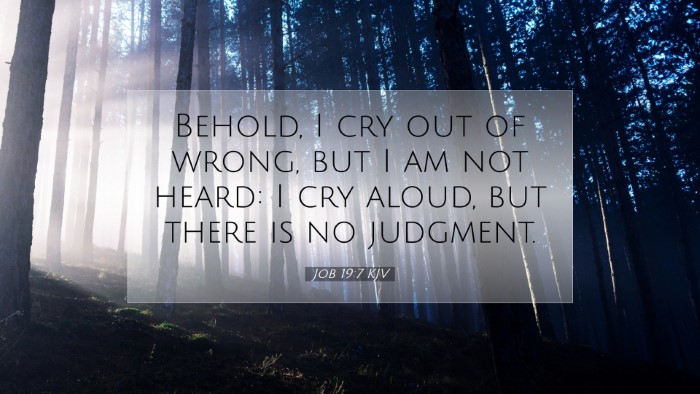Old Testament
Genesis Exodus Leviticus Numbers Deuteronomy Joshua Judges Ruth 1 Samuel 2 Samuel 1 Kings 2 Kings 1 Chronicles 2 Chronicles Ezra Nehemiah Esther Job Psalms Proverbs Ecclesiastes Song of Solomon Isaiah Jeremiah Lamentations Ezekiel Daniel Hosea Joel Amos Obadiah Jonah Micah Nahum Habakkuk Zephaniah Haggai Zechariah MalachiJob 19:7
Job 19:7 KJV
Behold, I cry out of wrong, but I am not heard: I cry aloud, but there is no judgment.
Job 19:7 Bible Commentary
Commentary on Job 19:7
Verse: "Behold, I cry out, 'Violence!' but I am not heard; I shout for help, but there is no justice."
Contextual Overview
The Book of Job presents a profound exploration of human suffering, divine justice, and the nature of God. In Job 19, the dialogue shifts as Job contemplates his suffering amidst the accusations of his friends who insist on his guilt as the cause of his misfortunes. This verse encapsulates Job’s desperate cry for acknowledgment and justice.
Matthew Henry's Insights
Matthew Henry, in his comprehensive commentary, emphasizes Job's plight as one marked by profound injustice. Job appeals to a higher standard of truth, feeling forsaken and misunderstood by both God and man.
- Desperation in Suffering: Henry notes Job’s transition from physical suffering to an emotional plea for justice, signifying the depth of pain he experiences.
- The Cry for Justice: Job’s cry of “violence” indicates not only his physical mistreatment but also a spiritual and social injustice that he feels is being overlooked.
- The Silence of God: Henry underscores Job's feeling of abandonment, presenting God as silent in his suffering, thereby enhancing Job’s anguish.
- Implications for Believers: The commentary suggests that believers may also feel voiceless in their distress; however, Job’s cries serve as a reminder that lament can be a form of prayer, bringing our true feelings before God.
Albert Barnes' Observations
Albert Barnes provides a detailed analysis of the text, focusing on the theological implications of Job's assertion of innocence in the face of suffering.
- Innocence and Suffering: Barnes argues that Job’s assertion, "I cry out, 'Violence!'" signifies his innocence, urging that he has not sinned to deserve this calamity.
- God’s Inaccessibility: The point is made that Job feels isolated, suggesting that his cries are directed toward a God who seems unresponsive to his pleas.
- Recognition of Divine Justice: Despite the silence, Barnes reflects that Job’s understanding of God’s justice is not fractured; he continues to appeal to a God who must ultimately be just.
- Application for Believers: Barnes encourages reflection on how believers may confront personal suffering and how to maintain faith amid apparent divine silence.
Adam Clarke's Commentary
Adam Clarke examines the emotional and literary aspects of Job's lament, presenting a well-rounded perspective on the text.
- Literary Structure: Clarke points out that Job’s emotional language serves not only as a cry for help but embodies poetic lamentation common in Ancient Near Eastern literature.
- The Human Experience of Suffering: Clarke interprets Job’s cry as a universal portrayal of human distress, touching the hearts of all who experience injustice.
- Faith amid Doubt: Despite the bleakness, Clarke finds a glimmer of faith in Job’s voice—he still acknowledges a need for justice, implying hope for divine intervention.
- Pastoral Applications: Clarke’s insights suggest that pastoral care must address both the emotional turmoil and theological questions of those in pain.
Theological and Pastoral Implications
Job 19:7 invites deep theological reflection on suffering, justice, and divine silence. The verses challenge pastors, theologians, and students to engage with the discomfort of unanswered prayers and apparent injustice, drawing parallels with the experiences of contemporary believers.
- Suffering and Justice: This verse calls for an examination of how justice is perceived and enacted within the community of faith, urging leaders to listen to the laments of their congregants.
- God's Silence: The commentary suggests that finding God in silence is a crucial theme; it invites believers to wrestle with their faith in the absence of immediate answers.
- Lament as Worship: The insights indicate the importance of lament as a form of honest worship and connection with God, which can encourage vulnerability in prayer.
- The Human Condition: Acknowledging suffering leads to deeper discipleship and a call to be the hands and feet of God in extending justice and compassion to those in need.
Conclusion
In summary, Job 19:7 serves as a poignant reminder of the struggles of the human spirit in the face of suffering and injustice. Through the insights of Matthew Henry, Albert Barnes, and Adam Clarke, we explore the depths of pain and the longing for justice that resonate throughout the ages. This verse compels readers to acknowledge their feelings, seek understanding, and aspire to be conduits of God’s grace, particularly amidst suffering.


